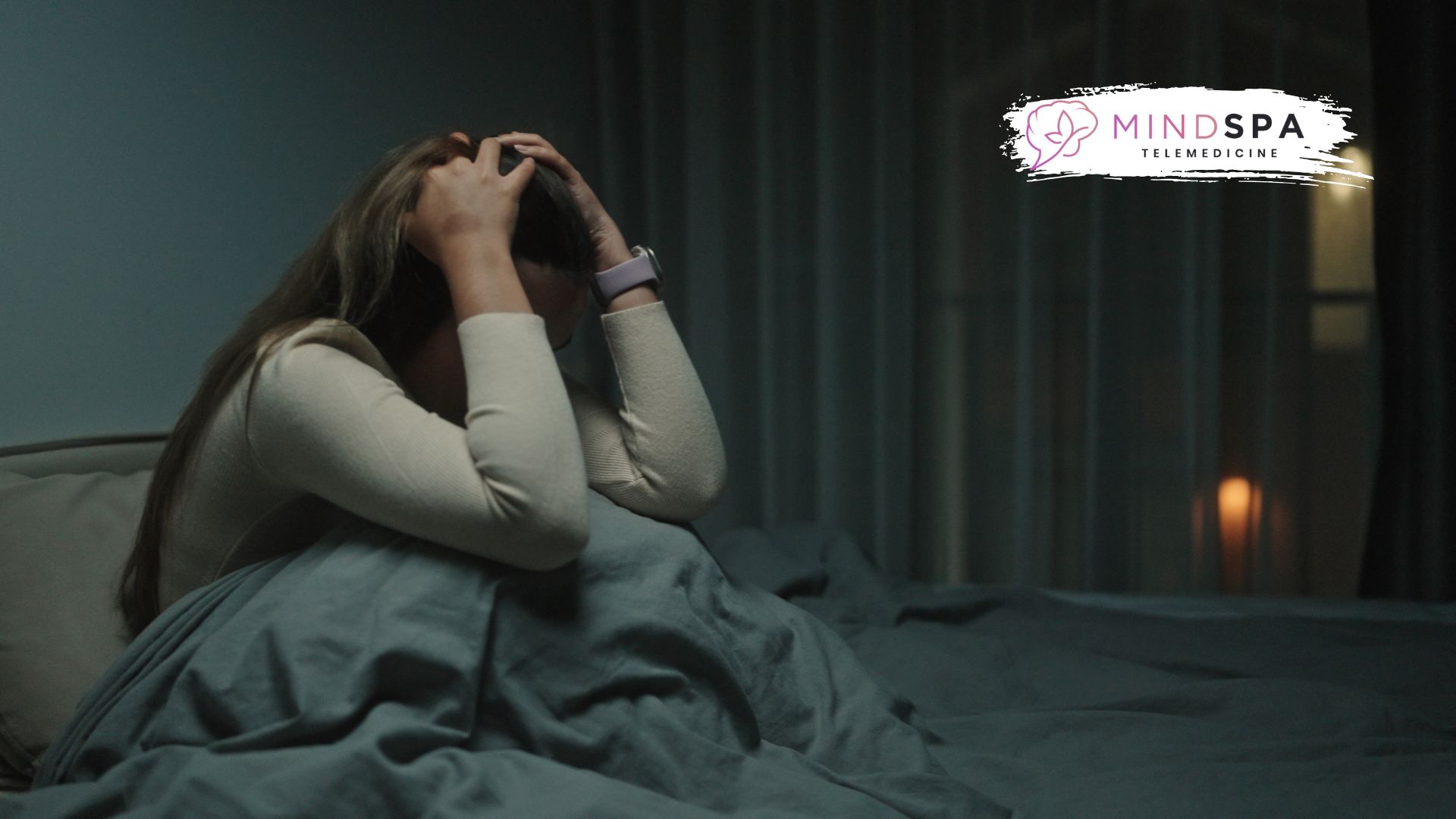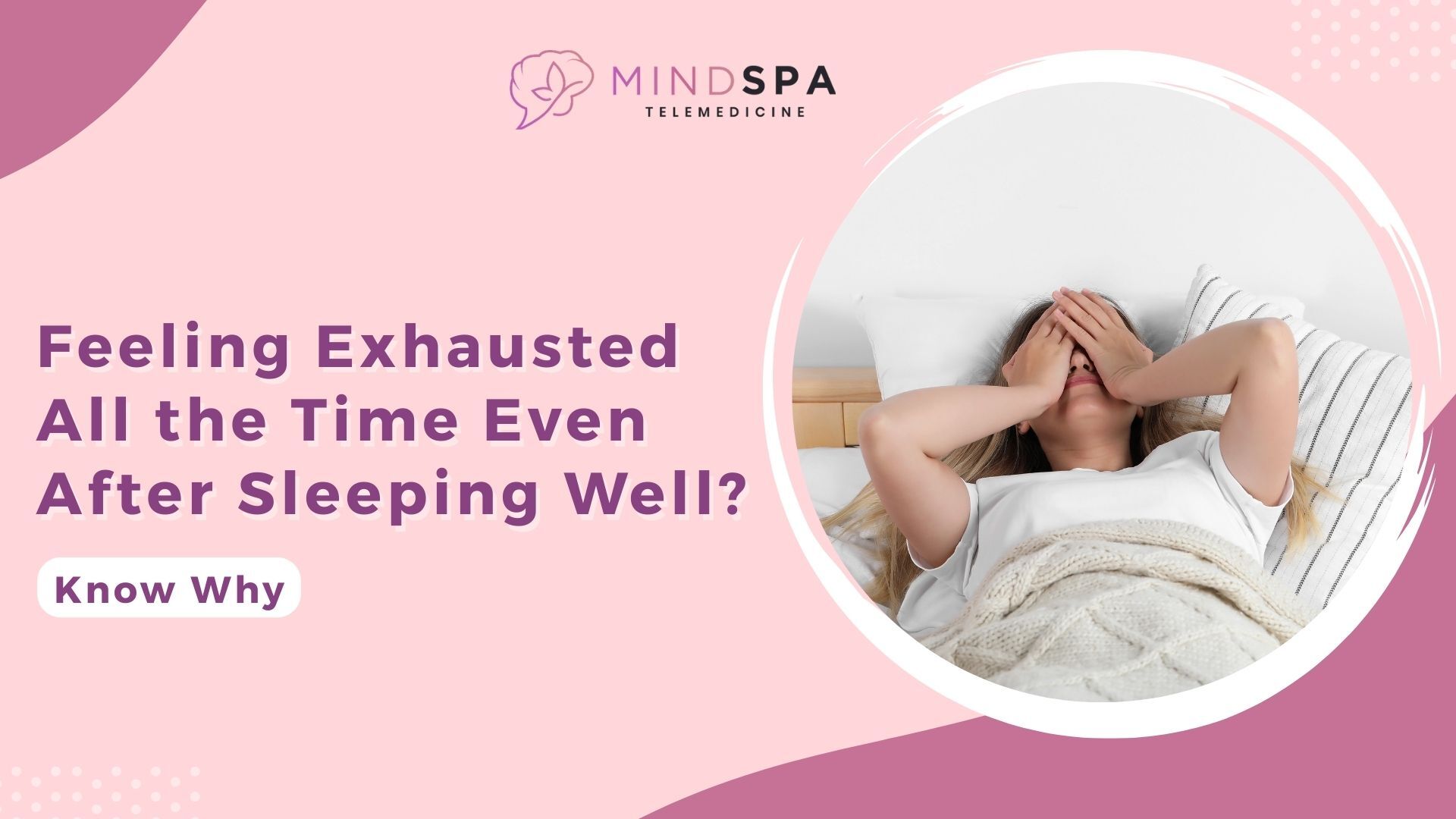You go to bed at a reasonable hour. You sleep through the night. But you still wake up feeling like you ran a marathon. You drag through your day. Your body feels heavy. Your brain feels foggy. And no amount of coffee seems to help.
If you’re constantly feeling drained—even after a full night’s rest—it’s time to look deeper. At MindSpa Telemed, we help individuals like you understand the hidden emotional and psychological causes of fatigue. Because sometimes, it’s not just your body that’s tired. It’s your mind.
When Sleep Isn’t the Problem
Fatigue is more than physical tiredness. It’s a whole-body experience. And while lack of sleep is the most obvious cause, it’s far from the only one.
You might be sleeping 7 to 9 hours a night. You might not be waking up. And your sleep might even be tracked as “high quality” by your wearable. But if you still feel tired all day, your exhaustion might be rooted in something else.
Emotional burnout. Chronic stress. Anxiety. Depression. These are common, often hidden, causes of persistent fatigue. Your mind can wear you down just as much—if not more—than a poor night’s sleep.
Also Read: Difference Between Sleep Apnea and Insomnia

Emotional Fatigue Is Real
We often think of stress as something that happens during high-pressure moments. But emotional fatigue is the silent kind that builds over time. It comes from constantly worrying, overthinking, suppressing your feelings, or managing difficult relationships. It’s the exhaustion that sets in when your nervous system is stuck in “survival mode” long after the danger has passed.
You might feel tired even after resting because your brain never really gets to shut off. You sleep, but you don’t recover.
Many clients we see at MindSpa are surprised when they realize their exhaustion isn’t just physical. It’s emotional. And with therapy, they start to feel real energy again—for the first time in years.

Could It Be Chronic Fatigue Syndrome?
CFS is a complex condition that causes persistent, unexplained fatigue that doesn’t improve with rest.
Common symptoms include:
- Unrefreshing sleep
- Memory and concentration problems (“brain fog”)
- Muscle or joint pain
- Headaches
- Dizziness
- Worsening symptoms after physical or mental effort
- Sensitivity to light or sound
While CFS is a medical condition, emotional health plays a significant role in how symptoms appear and persist. Therapists can support your journey by helping you cope with mental strain, trauma, and lifestyle triggers that may worsen fatigue.

You Might Be Burnt Out
Burnout isn’t just something professionals face. Parents, students, caregivers, and anyone navigating emotional overload can experience it. Burnout occurs when prolonged stress leads to physical, emotional, and mental collapse.
Here are a few signs you’re emotionally burnt out:
- You dread small tasks
- You feel numb or detached
- You can’t focus
- You feel “tired of being tired”
- Even relaxing activities feel overwhelming
Sound familiar? Burnout isn’t fixed by taking a day off. It’s fixed by restructuring your mental habits, emotional boundaries, and energy output—which is where therapy can help.
Is Your Mind Keeping You Tired?
Our thoughts and emotions can wear us out. Anxiety, depression, trauma, and even repressed emotions keep your brain working overtime. Your nervous system is always alert, even while you sleep.
When your brain never fully powers down, you don’t reach the kind of rest that restores you. That’s why you can sleep 8 hours and still feel like collapsing midday.
At MindSpa Telemed, we help you uncover what your mind might be holding onto—whether it’s unprocessed emotions, negative thought loops, or unresolved stress. When you process and release that weight, your body finally gets to rest.

Real Solutions for Mental Fatigue
Here’s what actually helps when your energy feels stuck:
- Create structure in your day. Chaos and decision fatigue drain your mental energy.
- Reduce multitasking. Your brain works better with focused attention.
- Get outside. Sunlight and movement reset your body’s natural energy cycle.
- Talk to someone. Processing your thoughts with a therapist helps free up mental space.
- Disconnect regularly. Endless scrolling keeps your brain overstimulated.
We know life can’t always slow down. But therapy teaches you how to slow your mind—so you can stop running on empty.

Ready to Reclaim Your Energy?
You don’t have to live in a fog. Feeling tired all the time isn’t something to just “push through.” It’s your body and mind asking for help.
At MindSpa Telemed, our licensed therapists help you uncover the hidden reasons behind your exhaustion. We don’t hand you a pill or a quick fix. We offer long-term support, deep emotional work, and real tools to help you finally feel rested.
Take the first step toward feeling like yourself again.
Frequently Asked Questions
Why do I feel drained all the time?
You may be emotionally or mentally overwhelmed. Stress, anxiety, depression, or burnout can all cause chronic fatigue—even if you sleep enough. Your brain may be working overtime trying to manage unprocessed thoughts and emotions, leaving you feeling exhausted.
How do I stop feeling drained every day?
Sleep may not be the problem. Emotional exhaustion, chronic stress, or mental health issues can prevent deep, restorative rest. Your body sleeps, but your brain stays active. Therapy can help you release mental strain and feel truly rested again.
Why am I so tired even after a good night's sleep?
There isn’t a one-time cure, but overthinking is absolutely manageable. With consistent mental health support, new thought habits, and coping tools, people can significantly reduce how often they overthink and how much it affects their lives.
What are the 7 symptoms of chronic fatigue syndrome?
The seven key symptoms of chronic fatigue syndrome include persistent fatigue that doesn’t improve with rest, brain fog or memory problems, muscle or joint pain, unrefreshing sleep, frequent headaches, dizziness or lightheadedness, and post-exertional malaise—where symptoms worsen after physical or mental activity.
Is 5 hours of sleep enough?
No. Most adults need 7–9 hours of sleep per night for full recovery. Chronic sleep deprivation can harm your physical and mental health. Even if you feel functional on 5 hours, your brain and body are likely paying the price over time.


